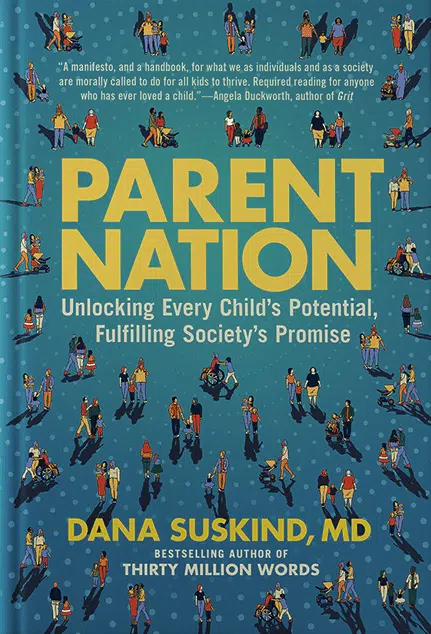In 1995 two researchers named Betty Hart and Todd Risley published a book titled Meaningful Differences in the Everyday Experience of Young American Children. Drawing on their detailed study of 42 Kansas families, they documented a significant gap in the early-life language exposure of children between income groups. Aggregating across the first three years, they argued that there was a “30 million word gap” between the language exposure of higher-income children and their lower-income counterparts.
Later research has questioned whether the gap is really 30 million words or if it’s smaller. But it is clear the gap is there, and that exposure in early life is correlated with language development later, reading, and other achievement measures. The idea of the 30 million word gap has become a symbol of overall inequality in early childhood.
Dana Suskind is a professor of surgery and pediatrics at the University of Chicago Medical Center and the director of the University of Chicago Medicine’s Pediatric Hearing Loss and Cochlear Implant Program. In 2015 she wrote a book on the word gap: Thirty Million Words: Building a Child’s Brain.
That book, which I love, focused on using the insights from this work on the word gap to help people in their own parenting. It talks through the details of the research on language exposure, the importance of talking to kids, and even how to do it. The reality, though, is that a book like this — however helpful at an individual level — isn’t necessarily going to do much to close inequality gaps.
This is in part because of differential exposure to these messages across groups. But it’s also because these inequalities are so deeply rooted in the societal supports we provide that parenting advice alone is hardly going to make a dent. This is a lesson I think about frequently. My popular-writing work — this newsletter, my books — focuses on advice for individual parents about how they can make the optimal choices (using data) given the constraints they face. But in my teaching and my academic work, I think much more about the ways that broader policies impact child and family outcomes, and the inequities in those outcomes.
Dr. Suskind’s new book, Parent Nation, grapples precisely with this second question. How do we build social and policy structures that are broadly supportive of families across the income spectrum? These issues were there before the pandemic, but COVID-19 has exacerbated them — closed schools and child care, unemployment, lack of sick leave, and more. A key point of the book is that we cannot simply expect all of this burden to fall on individual families; building societal supports is non-negotiable.
For anyone interested in child and family policy, parenting, or kids (presumably nearly every reader of this newsletter), this book is a must-read. To highlight why, I asked Dr. Suskind just two — but hard! — questions on how we can reconcile evidence on the importance of the early years of life, and on the best use of limited policy dollars. Enjoy!—Emily
I became especially aware of how much parents worry about individual choices after I published my first book, Thirty Million Words, which distilled the science of foundational brain development for parents and other adults. This, of course, is the science illustrating that foundational brain development is dependent on what happens in the first three years of life. A child’s brain will never be more receptive to experience than it is in this pivotal time. Eighty-five percent of brain growth occurs between birth and the age of 3, a period during which 1 million neural connections per second are formed, which tells us this is a period of incredible opportunity and great risk.
So of course parents want to make the “right” choice at every turn, especially in those crucial early years, which is why parents were constantly asking me for highly prescriptive advice. How many words per day should they be using? What kinds of words? In how many languages?
The reality is, we can’t answer those questions with great specificity. And, as you correctly point out, most individual choices have only marginal impacts. There are no magic answers in parenting, just as there is no magic number of words a baby must hear.
But there are two crucial and specific things children need to build a healthy foundation of cognitive and socio-emotional skills that will serve them throughout life: nurturing interaction with caregivers and protection from toxic stress.
I like to summarize this science by saying that there are many ways to parent but only one way to build a brain.
After all, a child can be nurtured while breastfeeding or cuddling in for a quiet bottle; they can receive rich interaction from a parent at home or a qualified, fairly compensated child care provider. So long as a child receives that nurturing interaction and protection from toxic stress, their young brain will have the opportunity to develop optimally. My late husband — a brilliant pediatric surgeon — who was exclusively bottle-fed as a baby, used to say as I struggled to nurse my firstborn, “Don’t worry, honey, my mother only bottle-fed me, and I turned out okay!”
He was right, of course. But the issue facing our country is that we’ve made it almost impossible for far too many parents to meet those two basic needs. We’ve erected barriers in front of almost everyone — from the mundane to the monumental. And we’re only going to move the needle on improving outcomes for kids with systematic reforms, not individual choices. I actually think this is precisely why parents feel that every decision is so critical: when you have no control over the most important things, you tend to focus on the smaller things you can control.
In recent decades, more and more economic risk has shifted from the broad shoulders of government and business onto the fragile backs of American families. Political scientist Jacob Hacker describes this as “the great risk shift,” and the result is widespread economic insecurity. Other researchers have found that increasing economic inequality (in countries such as the United States) is, understandably, associated with parents pushing harder to ensure their children have a path to security and success. I was born in the 1960s, and I don’t think my parents, who both had advanced degrees, asked me once about my homework! But as economists Matthias Doepke and Fabrizio Zilibotti explain, our economic reality has transformed parenting into a frantic, anxiety-ridden experience.
I want all parents to recognize this! That their experience, their struggles, their stress, is largely driven by our nation’s social and economic structures, not individual choices. One parent I spoke with when writing the book told me, “I felt like I was failing in all parts of my life.” This is such a common sentiment among families today, but I want moms like her to ask “Why is my society failing me?” instead of “Why am I failing at this?”
Honestly, if I had a magic wand and could choose to (a) give the 60 million parents raising kids in this country all the right scientific insights and tools to optimize their behavior or (b) change the societal constructs in which those parents live — I would choose the latter. All parents want the best for their children, and it’s time we recognize that we, as a society, are getting in the way. That we must, finally, take steps to protect the incredible evolutionary gift that bestows on all children the potential to reach their potential.
First is paid parental leave. Paid leave allows parents time to develop the nurturing relationships that are crucial to healthy brain development. It’s important to remember that learning begins on the first day of life, not the first day of school. The earliest years of a child’s life are full of opportunity but also risk because of the incredible brain growth that occurs during this time.
Fortunately, powerful nurturing interactions between infant and caregiver begin on the first day of a child’s life as well. And yet far too few Americans (only 23% of those employed in the private sector) have paid leave that allows them to maximize those interactions. As you know, the U.S. is the only developed nation not to mandate such leave. Remarkably, 1 in 4 new mothers return to work within two weeks of giving birth!
The economic benefits of paid leave are well established. More recently, studies have also found that paid leave benefits the health of mothers and children. Paid leave is associated with lower levels of postpartum depression, improved infant attachment, decreases in infant mortality and rehospitalizations, and increases in pediatric visits, timely immunizations, and in the initiation and duration of breastfeeding. When fathers take paid leave, it benefits both parents’ mental health; and married parents who both take leave are, even, less likely to divorce.
One incredible new study even compared moms and babies from two groups: moms who received paid leave and those who received unpaid leave. The infants whose mothers had paid leave were more likely to have more high-frequency (and less low-frequency) brain wave patterns. Why is that? Well, the researchers also measured cortisol levels in the mothers’ hair, which are a biomarker of stress. Unsurprisingly, mothers who had paid leave had lower physiological stress than mothers with unpaid leave. It’s important to note this study is only correlational. It was not an RCT [randomized controlled trial]. But it reveals something profoundly important about what we’re getting wrong for too many parents.
Next is an expanded child tax credit. This is a policy that benefits nearly every parent in America. It makes it possible for more parents who want to stay home with their children to do so, and it recognizes and rewards their vitally important work. For parents who want or need to work, a child tax credit can help ease the overwhelming cost of child care. The truth is, raising children is hard and it is expensive. So much so that financial concerns are causing a significant number of Americans to have fewer children than they would ideally like to have. An expanded child tax credit is an obvious way to help such families.
Furthermore, we know that this policy can alleviate poverty, and we know poverty, and its associated toxic stress, is detrimental to development. In fact, neuroscience has demonstrated that children growing up in poverty display differences in the very structure and function of their brain. A 2015 study by neuroscientist Kimberly Noble and her colleagues, for example, found a consistent relationship between the size of a brain’s cortical surface area (which is related to cognitive ability) and socioeconomic factors.
Tax credits for families with young children are among the most effective policies at reducing rates of childhood poverty. We saw this in action during the pandemic, when a historic expanded tax credit brought about an immediate reduction in childhood poverty rates. But when those payments stopped early this year, the rates spiked from 12% to 17% — higher than before the pandemic. We simply cannot allow this to continue. The childhood poverty rate in this country is a stain on our national conscience.
Finally, I’d propose a policy that helps parents spend time with their children and offers protection from toxic stress: portable worker benefits. Portable benefits are connected to an individual rather than a particular job or employer. And in the age of gig work and side hustles, they are critical. Though it’s worth noting they are not an entirely new idea. After all, Social Security is a portable benefit, as are retirement savings plans that travel with an employee. A recent Aspen Institute report suggests that portable benefits should cover independent contractors and part-time workers, not just traditional employees, with companies contributing a fixed rate based on how many hours an individual works for them.
This might seem an odd choice to round out my list, but portable health insurance and unemployment insurance would go a long way to increasing families’ economic security and thus, reducing their toxic stress. At the same time, portable parental leave and unemployment benefits would grant more workers critical time with their children. After decades of the “great risk shift” bringing great uncertainty to the American family, it’s time we shift the burden once again, so that families can focus on the care of their children.
These policies (and others!) are crucial to the future well-being of the American family, society, and economy. And I think the first step in making them a reality is raising our collective expectations of society. I want every parent in this country to realize they should not have to go it alone when it comes to raising children; that society can and should play a role; and that it is time for us to come together to make our needs known with one powerful, united, and undeniable voice.
Community Guidelines
















Emily:
One of the tensions I have always seen is that when we look at the impacts of individual parenting choices — say, whether to breastfeed, or how to sleep, or whether to use day care or a nanny, or which child care setting — it’s very difficult to find any evidence that these matter on the margin. And yet: it seems clear (from your book and others) that the first several years of life are extremely important in a broad sense for child outcomes. Do you have thoughts on how we reconcile these two ideas? Is there some missing crucial specific behavior? Or is it something more nebulous?